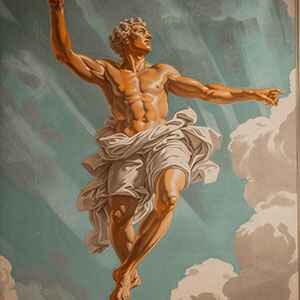
Parentage and Generation: Phoebe is one of the Titans, the children of Uranus and Gaea. Her siblings include Cronus, Rhea, Coeus, Oceanus, and Tethys, among others.
Consort and Offspring: Phoebe is often identified as the consort of her brother, Coeus. Together, they are the parents of Leto, who becomes the mother of Artemis and Apollo, major deities in the Greek pantheon.
Symbolism of Light: The name "Phoebe" is derived from the Greek word "phoibos," meaning bright or shining. As such, Phoebe is associated with light, radiance, and illuminating qualities.
Associations with Prophecy: Phoebe is sometimes linked to the gift of prophecy. In some traditions, she is considered an oracle or seer, possessing the ability to foresee future events.
Genealogy of Gods: Phoebe's descendants, particularly Artemis and Apollo, play crucial roles in the Olympian pantheon. Apollo, associated with the sun and prophecy, reflects the radiant qualities associated with Phoebe.
Role in the Titanomachy: During the Titanomachy, the war between the Titans and the Olympians, Phoebe and most Titans sided with Cronus against Zeus and the other Olympian gods. After the Titans' defeat, they were banished to Tartarus.
Post-Titanomachy Fate: Phoebe, like other Titans, is considered to have been imprisoned in Tartarus following the Titanomachy. This deep abyss served as a place of punishment for those who opposed the Olympian gods.
Cultural and Literary References: Phoebe is mentioned in Hesiod's "Theogony," where the poet outlines the genealogy of the gods. The Titans, including Phoebe, represent the earlier generation that precedes the reign of the Olympians.
Associations with the Moon: In later interpretations, the name Phoebe became associated with the moon. This association is reflected in the name of Saturn's moon Phoebe, discovered in 1899.
Phoebe's significance lies in her role as a Titaness and as the mother of Leto, whose children, Artemis and Apollo, hold important places in Greek mythology. While not as central to myths as some other figures, Phoebe contributes to the larger narrative of the generational conflict between the Titans and the Olympians.
Immediate Family
Quick Facts
- Phoebe is one of the Titans, born from Uranus and Gaea.
- She is associated with light, radiance, and prophecy.
- Phoebe is the consort of her brother, Coeus, and the mother of Leto.
- Her descendants, Artemis and Apollo, play crucial roles in the Olympian pantheon.
- Phoebe participated in the Titanomachy, siding with Cronus against the Olympians.
- Following the Titanomachy, she was imprisoned in Tartarus.
- Phoebe's name is associated with the moon in later interpretations.
Further Reading
Art &
Architecture
Ancient Greek art and architecture, with its harmonious proportions and timeless elegance, continue to inspire awe and admiration millennia later.
Discover
Greek Mythology & Mythical Characters
Greek mythology, a rich tapestry of gods, heroes, and mythical creatures, captivates the imagination with its tales of love, betrayal, and epic adventures that delve into the depths of the human psyche.
Discover
Ancient Greek History
Ancient Greek history, marked by remarkable achievements in democracy, philosophy, and warfare, shaped the foundation of Western civilization, leaving an indelible legacy of innovation and cultural influence that continues to resonate to this day.
Discover
Ancient Greek Olympics
The ancient Greek Olympics, held in Olympia every four years, celebrated athleticism, unity, and cultural pride, serving as a testament to the enduring spirit of competition and excellence that transcends time and borders.
Discover
Ancient Greek Wars
Ancient Greek wars, such as the Persian Wars and the Peloponnesian War, were pivotal conflicts that shaped the course of history, highlighting the struggle for power, independence, and the clash of civilizations in the ancient Mediterranean world.
Discover
Ancient Greek Culture and Society
Ancient Greek culture and society, characterized by its emphasis on art, philosophy, and civic engagement, fostered a vibrant intellectual and social landscape where innovation flourished, democracy thrived, and the pursuit of knowledge and excellence was celebrated as fundamental values of civilized life.
Discover

